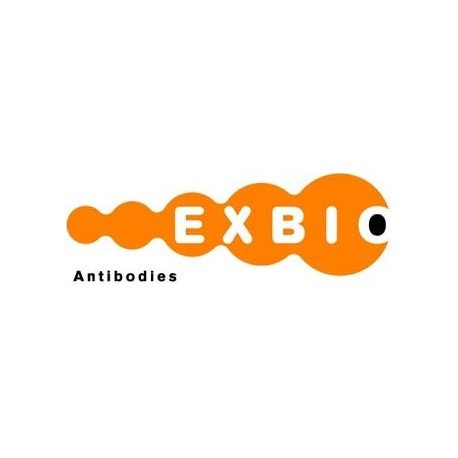Cart 0 Product Products (empty)
No products
To be determined Shipping
0,00 € Total
Prices are tax excluded
Product successfully added to your shopping cart
Quantity
Total
There are 0 items in your cart. There is 1 item in your cart.
Total products (tax excl.)
Total shipping (tax excl.) To be determined
Total (tax excl.)
Data sheet of Mouse Monoclonal to CD1a
| Brand | Exbio |
| Product type | Primary antibodies |
| Reactivity | Other not tested, Human |
| Clonality | Monoclonal |
More info about Mouse Monoclonal to CD1a
| Brand: | Exbio |
| Product no.: | 11-364-C025 |
| Product type: | Primary antibodies |
| Host species: | Mouse |
| Product name: | Mouse Monoclonal to CD1a |
| Antigen: | CD1a |
| Clonality: | Monoclonal |
| Clone: | HI149 |
| Isotype: | IgG1 |
| Immunogen: | Human thymocytes |
| Format: | purified |
| Specificity: | The antibody HI149 reacts with CD1a (T6), a 49 kDa polypeptide associated with beta2-microglobulin expressed on cortical thymocytes (strongly), Langerhans cells, dendritic cells and some T cell leukemias and lymphomas. The antibody does not react with peripheral blood T and B lymphocytes, monocytes, granulocytes, platelets and erythrocytes. HLDA V; WS Code CD01.01 |
| Categories: | CD and Related Antigens (Human) |
| Concentration: | 1 mg/ml |
| Storage buffer: | Phosphate buffered saline (PBS) with 15 mM sodium azide, approx. pH 7.4 |
| Storage / stability: | Store at 2-8°C. Do not freeze. Do not use after expiration date stamped on vial label. |
| Background: | CD1a, together with CD1b and c, belongs to group 1 of CD1 glycoproteins. These proteins serve as antigen-presenting molecules for a subset of T cells that responds to specific lipids and glycolipids found in the cell walls of bacterial pathogens or self-glycolipid antigens such as gangliosides, and they have also roles in antiviral immunity. Unlike CD1b, CD1a is excluded from late endosomal compartments and instead traffics independently in the recycling pathway of the early endocytic system, and CD1a antigen presentation is independent upon vesicular acidification. |
| Purity: | > 95% (by SDS-PAGE) |
| Purification: | Purified by protein-A affinity chromatography |
| Product specific references: | *Säemann MD, Parolini O, Böhmig GA, Kelemen P, Krieger PM, Neumüller J, Knarr K, Kammlander W, Hörl WH, Diakos C, Stuhlmeier K, Zlabinger GJ: Bacterial metabolite interference with maturation of human monocyte-derived dendritic cells. J Leukoc Biol. 2002 Feb;71(2):238-46., *Chen X, Murakami T, Oppenheim JJ, Howard OM: Triptolide, a constituent of immunosuppressive Chinese herbal medicine, is a potent suppressor of dendritic-cell maturation and trafficking. Blood. 2005 Oct 1;106(7):2409-16., *McKenna RW, Asplund SL, Kroft SH: Immunophenotypic analysis of hematogones (B-lymphocyte precursors) and neoplastic lymphoblasts by 4-color flow cytometry. Leuk Lymphoma. 2004 Feb;45(2):277-85., *Perros F, Dorfmüller P, Souza R, Durand-Gasselin I, Mussot S, Mazmanian M, Hervé P, Emilie D, Simonneau G, Humbert M: Dendritic cell recruitment in lesions of human and experimental pulmonary hypertension. Eur Respir J. 2007 Mar;29(3):462-8., *Kirsch BM, Zeyda M, Stuhlmeier K, Grisar J, Smolen JS, Watschinger B, Stulnig TM, Hörl WH, Zlabinger GJ, Säemann MD: The active metabolite of leflunomide, A77 1726, interferes with dendritic cell function. Arthritis Res Ther. 2005;7(3):R694-703., *And many other., *Demedts IK, Brusselle GG, Vermaelen KY, Pauwels RA: Identification and characterization of human pulmonary dendritic cells. Am J Respir Cell Mol Biol. 2005 Mar;32(3):177-84., *Mayer WJ, Irschick UM, Moser P, Wurm M, Huemer HP, Romani N, Irschick EU: Characterization of antigen-presenting cells in fresh and cultured human corneas using novel dendritic cell markers. Invest Ophthalmol Vis Sci. 2007 Oct;48(10):4459-67., *Hunger RE, Sieling PA, Ochoa MT, Sugaya M, Burdick AE, Rea TH, Brennan PJ, Belisle JT, Blauvelt A, Porcelli SA, Modlin RL: Langerhans cells utilize CD1a and langerin to efficiently present nonpeptide antigens to T cells. J Clin Invest. 2004 Mar;113(5):701-8., *Favali C, Tavares N, Clarêncio J, Barral A, Barral-Netto M, Brodskyn C: Leishmania amazonensis infection impairs differentiation and function of human dendritic cells. J Leukoc Biol. 2007 Dec;82(6):1401-6., *Angel CE, Lala A, Chen CJ, Edgar SG, Ostrovsky LL, Dunbar PR: CD14+ antigen-presenting cells in human dermis are less mature than their CD1a+ counterparts. Int Immunol. 2007 Nov;19(11):1271-9., *Leukocyte Typing V., Schlossman S. et al. (Eds.), Oxford University Press (1995). |
| General references: | *Raftery MJ, Winau F, Kaufmann SH, Schaible UE, Schönrich G: CD1 antigen presentation by human dendritic cells as a target for herpes simplex virus immune evasion. J Immunol. 2006 Nov 1;177(9):6207-14., *Hiromatsu K, Dascher CC, Sugita M, Gingrich-Baker C, Behar SM, LeClair KP, Brenner MB, Porcelli SA: Characterization of guinea-pig group 1 CD1 proteins. Immunology. 2002 Jun;106(2):159-72., *Sugita M, Grant EP, van Donselaar E, Hsu VW, Rogers RA, Peters PJ, Brenner MB: Separate pathways for antigen presentation by CD1 molecules. Immunity. 1999 Dec;11(6):743-52. |
| Related products: | - Mouse Monoclonal to CD2 - Mouse Monoclonal to CD1b - Mouse Monoclonal to CD1c |
| Shipping condition: | Room temperature |


